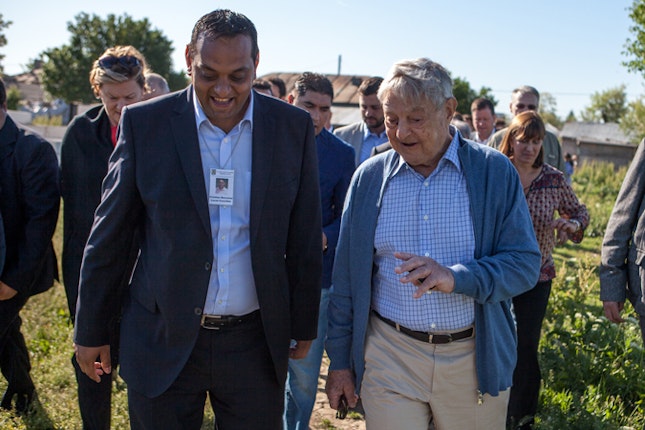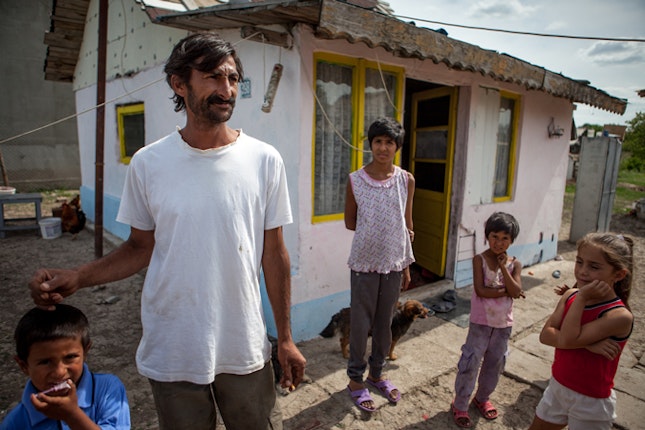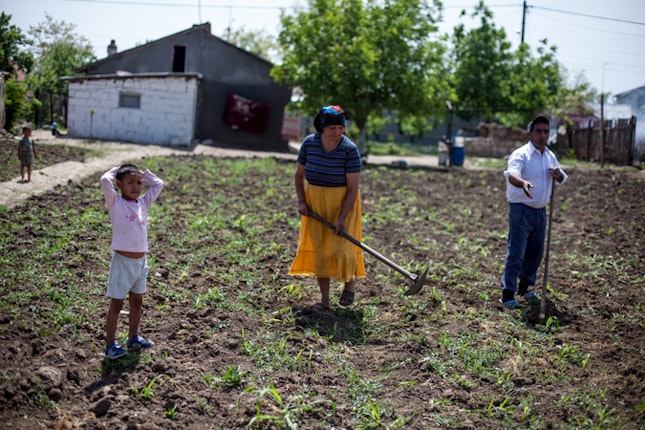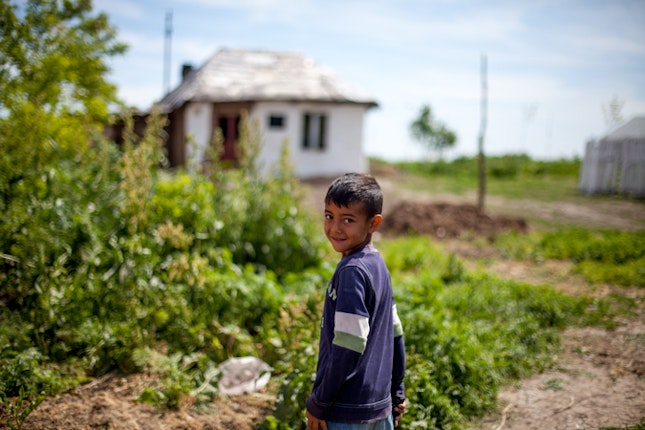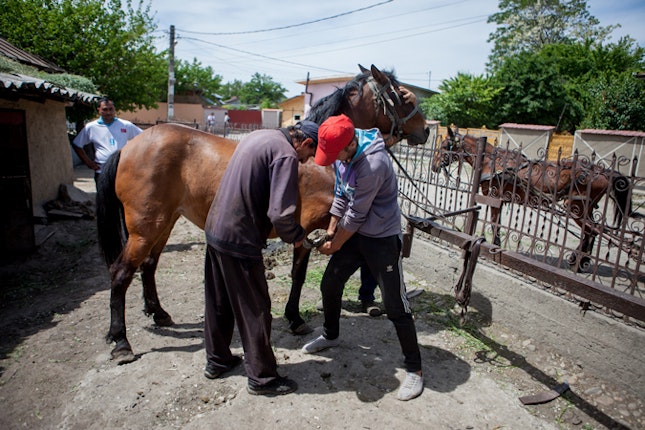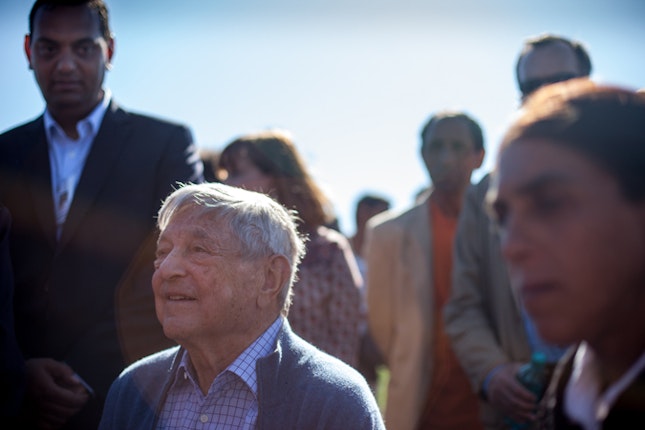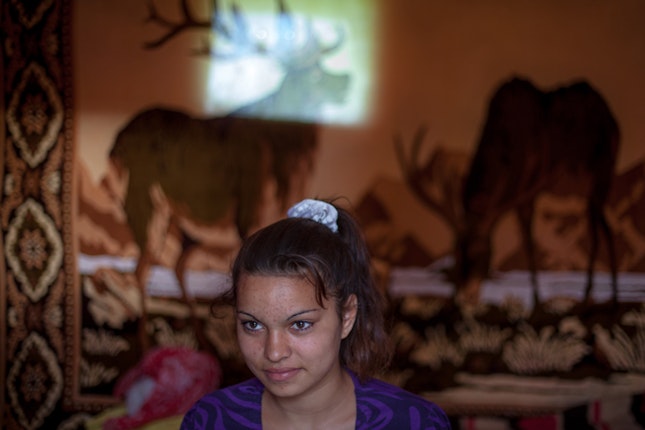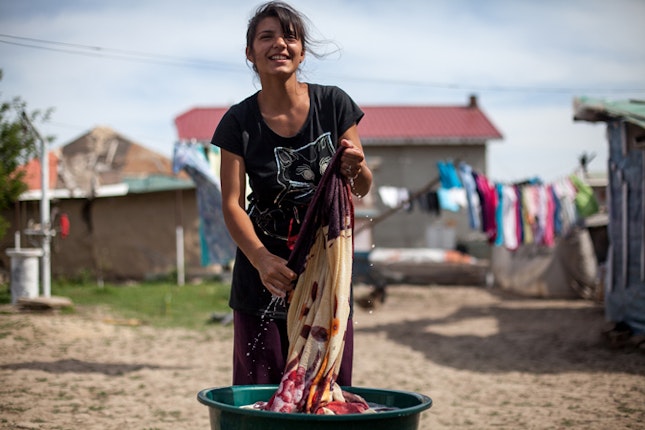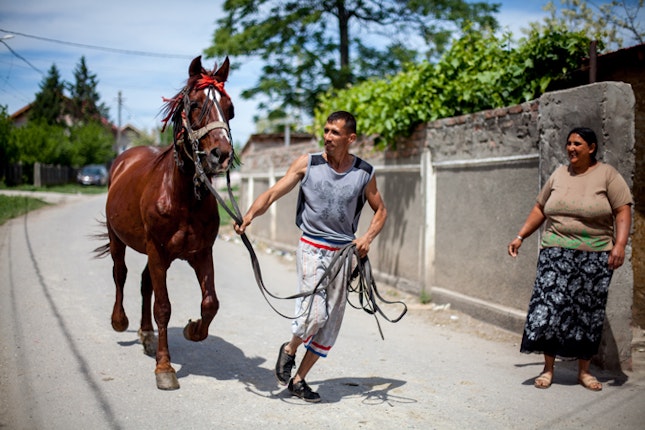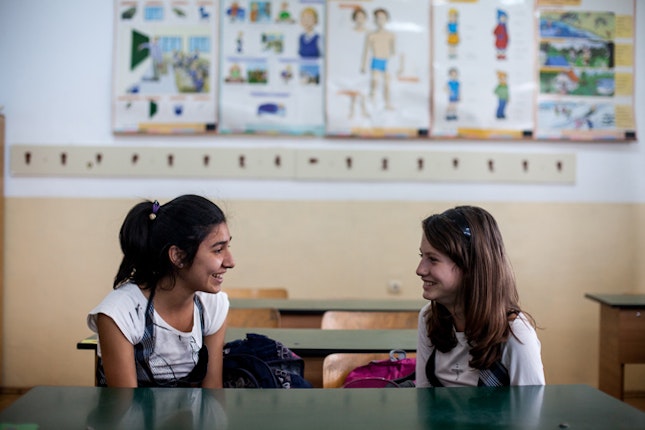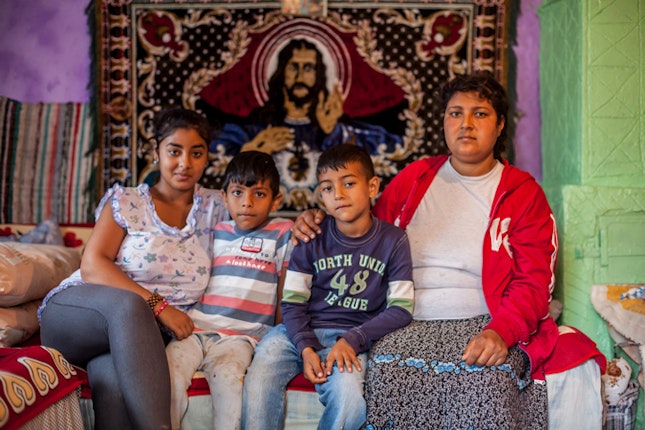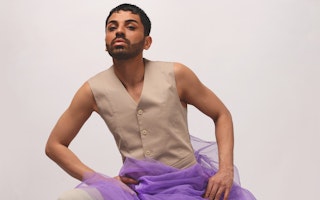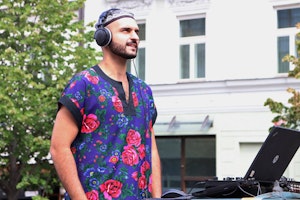Open Society Foundations and the World Bank Get Behind Education for Roma
By Eleanor Kelly
George Soros, founder and chair of the Open Society Foundations, and Jim Yong Kim, president of the World Bank, on May 10, visited Frumuşani, a small Roma village on the outskirts of Bucharest, Romania. In Frumuşani, the Roma Education Fund—supported by the World Bank, Open Society Foundations, the European Union, and other donors—is working to remove the barriers local Roma children face to complete their primary school education.
Frumuşani means beautiful in Romanian, but the conditions in which the Roma families live here are not.
A dusty track leads from the local school to the village. Most houses—made of mud walls with corrugated roofs—have no electricity, water, or proper sanitation. Children in Frumuşani often do their homework by candlelight.
Frumuşani is not the only village in Romania facing these challenges, but the plight of local residents, repeated all around Central and Eastern Europe, tells a bigger story of generational poverty, political apathy, and a legacy of segregation and distrust.
“We are one of the richest regions in the area and yet until recently no one knew how the budget was divided,” says Cristian Buceanu, a local Roma councilor elected in 2012. The lack of opportunity permeates every part of Frumuşani.
During a visit by George Soros and Jim Yong Kim to one house, a local man, Gheorghe Mircea explains: “The Roma are different. If we try to get a job, they won’t hire us.” Asked by George Soros how life now compares to life under Ceaușescu—Romania’s former communist leader who oversaw a brutal and repressive regime until 1989—Gheorghe Mircea replies, “Life was better; at least then we had jobs.” To make ends meet, Gheorghe Mircea and his family collect worms, which they sell as fishing bait. Some years back, his house burnt down after faulty electrical wiring, used to siphon electricity from his mother’s house next door, started a fire. Of his nine children, only three go to school. All participate in the Roma Education Fund School After School Program; his daughter is top of her class.
Last year Cristian Buceanu, the only Roma representative on the council, introduced a proposal to allocate approximately 10,000 euros to expand the electricity network to houses in Frumuşani. The other councilors voted against the proposal, alleging that the Roma townspeople do not contribute to the local budget and therefore should not benefit from public funds.
The government, however, almost entirely ignores the town’s inhabitants. Officially, most of the homes in Frumuşani do not exist. A recent land registry exercise from the mayor’s office recorded the area as largely empty. The asphalt road that joins the village to the main road stops on the town’s border—another sign that officially, the real Frumuşani is off the map. But the sprawling lanes of Frumuşani tell a different story.
Filled with rudimentary lean-to mud buildings as well as sturdier and older brick houses that predate the Ceaușescu era, Frumuşani is far from empty. Chickens peck in backyards, horses gallop past the town’s blacksmiths where local men congregate, and children on their way back from school mill past small vegetable gardens, dry and sparse due to the lack of water.
Children like 14-year-old Simona Nedelcu attend the local school where 700 students are split evenly between Roma and non-Roma. Here, Roma children participate in School after School and Equal Opportunities in Education, two Roma Education Fund programs that offer mentoring, homework clubs, and overall extra support in Math and Romanian--core subjects for national entry test for high school.
For two years, the programs have provided mentors to Roma students, offering guidance and building relationships between parents, schools, and students; stipends to cover school books and uniforms; homework clubs where students can complete their lessons undisturbed; and training so that teachers can play a positive role in Roma education. “With the School After School project, I have the sense that someone cares about us,” comments one Roma student during a visit by George Soros and Jim Yong Kim to the local school.
“Working with parents is as important as working with children,” explains Mihaela Gheorghe from the Romanian NGO, the Center for Education and Social Development, which works with children in Frumuşani. “Most parents do not know how to read or write so even if help exists for their children’s education, it is nearly impossible for them to find out about it.” Better access to schools and improving educational outcomes are key, explains Costel Bercus, of the Roma Education Fund.
From house to house in Frumuşani, parents all agreed on one thing—education is the key to change for their children’s future. Jim Yong Kim agrees. “Many countries often think of education as an expense,” he comments. “We want to say these are the most strategic investments you can make in a country.”
Still growing up in Frumuşani is not easy. For Simona Nedelcu, everyday tasks can be a struggle. In a two-room house, surrounded by siblings and family, finding somewhere quiet to do her homework is a challenge. Uniforms and books present more obstacles and often, children will stay home from school if they don’t have a clean uniform—not uncommon when washing materials, water, and electricity are scarce.
Cristian Buceanu is determined, despite the lack of support from his fellow councilors. He was elected last year with the support of local Roma townspeople who were familiar with him from the many years he spent working in the community. “We need to raise awareness with Roma in Frumuşani that they must ask for their rights,” says Cristian Buceanu, who explains that going door to door, talking with the local Roma is the best way to mobilize people behind change.
Pushing change with his fellow councilors is an uphill struggle. They do not see assisting local Roma as a priority. “For twenty years, no one asked about Roma. If Roma start to have their own representatives, this can change.”
It’s not difficult to see the changes education is bringing—and can bring—to Frumuşani and other Roma villages like it in Romania. Of Romania’s 21 million inhabitants, the Roma at nearly two million is a young population. Education offers a path for Roma to claim their own rights: the right to employment, the right to political participation and representation, the right to safe and adequate housing. All of this—all inalienable rights in an open society—begins with education and ideas as simple as a quiet place for Simona and her classmates to do their homework, and a mentor to encourage them to keep coming back to the classroom, despite the overwhelming challenges Roma children face at home.
Until May 2021, Eleanor Kelly was the regional head of communications for the Open Society Foundations.
